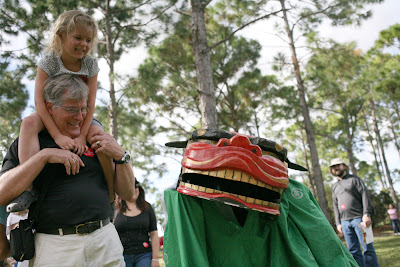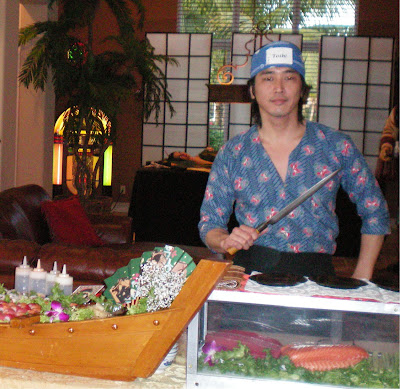Delray Beach, FL – December 8, 2009 – The Year of the Tiger marks 2010, and the Morikami Museum and Japanese Gardens will begin the New Year with its 33rd annual Oshogatsu celebration on Sunday, January 10, 2010, from 10 a.m. to 5 p.m.
Truly a family festival, Oshogatsu is a popular event for residents and visitors of all ages, featuring unique Japanese pastimes, games and customs. This year’s Oshogatsu will include:
· Mochitsuki, the pounding of the rice and making of mochi, large, round Japanese cakes.
· Musical performances by Friends of Koto
· Kakizome, the first calligraphy of the new year that expresses New Year’s greetings, poems or other familial phrases (limited seating, additional $3 charge)
· Omikuji, Japanese fortune telling
· Shishimai, periodic performances by the lion dancer and taiko drumming by Fushu Daiko
· Tea ceremony demonstrations, where participants practice serenity, peace and meditation (limited reservations, additional $5 charge)
* A variety of games including Go, Hanetsuki (similar to badminton), Daruma Otoshi (wood block game) and Fukuwarai, the Goddess of Happiness game
* Bouncehouses and arts & crafts

Oshogatsu is Japan’s most important yearly observance and a time of
renewal for families. The Japanese make a special effort in the final
days of December to clear away debts and obligations so as to start the
New Year afresh. Before Oshogatsu arrives, typically on January 1, many
Japanese will gather at locally prominent shrines and temples, where
they greet the stroke of midnight with exclamations of “Akemashite omedeto gozaimasu!,” or “Happy New Year!”
At home, the celebrations include exchanging a ceremonial drink called
otoso, a sweet kind of sake and enjoying a special dish called ozoni,
which is a traditional stew. The Japanese share many other holiday
customs with westerners, such as sending New Year’s greetings on post
cards, preparing special meals, decorating a tree and visiting loved
ones.
New! for this year, the Morikami will include the Kirin Beer Garden that is featured at Hatsume and Obon festivals. Guests will enjoy Kirin Japanese beers at $4 for draft and $5 for bottles, redeemable with tickets.
TICKETS PURCHASED AT THE GATE: $10 for adults; $5 for children 4-17; free for museum members and children 3 and under
TICKETS PURCHASED ONLINE BEFORE WEDNESDAY, JANUARY 6: $8 for adults; $4 for children 4-17
Cornell Café will be open, and a variety of American and Japanese food will also be available from vendors throughout the festival grounds.

Morikami Museum and Japanese Gardens has been a center for Japanese arts and culture in South Florida since its opening in 1977. The Morikami invites guests to discover South Florida’s heritage and its connection with Japan, explore a series of six diverse gardens inspired by a different historical period and style of Japanese garden. Experience traditional and contemporary Japanese culture through world-class exhibits, varied educational programs and seasonal events, bonsai display, pan-Asian cuisine and a distinctive museum store. Morikami Museum and Japanese Gardens is open 10 a.m. to 5 p.m. Tuesday through Sunday. The Morikami is located at 4000 Morikami Park Road in Delray Beach, Florida. For more information about the Morikami, its exhibitions, programs and events, visit www.morikami.org or call 561-495-0233.
Winter/Spring Events:
January 9 • Saturday – Tea Ceremony Workshop
Cost: $35
Time: 1 - 3:30pm
Location: The Morikami Museum Seishin-an Tea House
Advance registration is required.
For more information and registration, please go to www.morikami.org or call 561-495-0233 x 210.
The workshop will teach the basics of Sado - Tea Ceremony - necessary to know in order to learn more about the aesthetics of Sado or to better understand and fully enjoy the tea ceremony itself. Participants will become familiar with how to be a guest should one be invited to a Tea Ceremony and how to make a bowl of tea and serve it to a guest. The workshop is a prerequisite for those who have never taken a tea ceremony class but wish to start studying Sado.
January 10 • Sunday - Oshogatsu
Cost: $10 adults, $5 children (Museum members and children 3 and under FREE)
Time: 10am - 5pm
Location: Morikami Park - Rain or Shine
For more information, visit the website or call 561-495-0233.
January 14 • Thursday – Lecture: Be a Star at The Sushi Bar – The Secrets of Sushi
Cost: $10 (Members $7)
Time: 7:30pm, Museum doors open at 6pm.
Location: Theater · Speaker: Mr. Trevor Corson
The Cornell Café will be closed.
Advance Registration Required
For registration and additional information, please visit www.morikami.org or call 561-495-0233 x 235.
Bestselling author and Food Network TV personality Trevor Corson, who is America's only "Sushi Concierge," will share his surprising secrets about the history, techniques and etiquette of Japan's most mysterious cuisine. Mr. Corson has written the worldwide pop-science bestseller, "The Secret Life of Lobsters," and the highly-acclaimed foodie hit, "The Story of Sushi: An Unlikely Saga of Raw Fish and Rice." Prepare to amaze your friends with your newfound knowledge; you'll never eat sushi the same way again.
January 30 • Saturday - Basics of Sushi Workshop
Cost: $65
Time: 1 – 3pm
Location: Oki Education Studio· Instructor: Mitsutoshi Sekita
Advance registration required
For registration and additional information, please visit www.morikami.org or call 561-495-0233 x 210.
Sushi has entered the American palette as a cultural influence from Japan. Few know that sushi is not actually raw fish, but rice made with a bit of vinegar and sugar. Served with a variety of accompaniments and either cooked or raw fish and vegetables, it can take many forms. Participants in this hands-on workshop, led by Mitsutoshi Sekita, a sushi chef from a Japanese restaurant in Plantation, Florida, will learn the basics of sushi making, cultural information about sushi and of course, will enjoy their creations.
Materials: participants must bring a sharp 7 - 8 inch knife, cutting board (approximately 10” x 15”), apron and dishtowel.
January 31 • Sunday – “The Way of Taiko - The Heartbeat of Japan” – Taiko Drum Workshop
Cost: $50
Time: Three workshops to choose from - 10:15am – 12:15pm; 12:45 – 2:45pm; or 3 – 5pm
Location: Morikami Theater
Advance registration required
For registration and more information, please call 561-495-0233 ext. 210.
The workshop will include an introduction to the history of taiko. Participants will be taught how to understand sounds and movements, i.e., how to connect nature and the meaning of body movement. They will become familiar with the way of taiko and learn how to drum. Top performers from South Florida’s Fushu Daiko will conduct the workshop. The group is recognized by Seiichi Tanaka, the master of San Francisco Taiko Dojo, who brought taiko to the United States and who trained senior members of the Fushu Daiko group. Please wear comfortable clothes and shoes; jewelry is not recommended.
February 11 • Thursday – Lecture: Bridging Japanese and American Styles of Communication
Cost: $10 (Members $7)
Time: 7:30pm, Museum doors open at 6pm.
Location: Theater · Speaker: Dr. Lauren S. Crane
The Cornell Café will be closed.
Advance Registration Required
For registration and additional information, please visit www.morikami.org or call 561-495-0233 x 235.
Every culture has unspoken communication norms that need to be followed in order to seem polite. Because our own culture’s norms are as familiar to us as the air we breathe, we are usually unaware of them unless we sense something “strange.” In interactions between Americans and Japanese, shared familiarity with these norms cannot be assumed and “strange” feelings can lead to dysfunctional relationships. Dr. Crane’s lecture will focus on how we can form more accurate impressions and feel more comfortable in cross-cultural interactions by becoming more aware of each other’s norms.
February 13 • Saturday – Family Fun Program: Valentine’s Accessory Making
(All ages)
Cost: $2 with paid museum admission
Time: 11am – 3pm
Location: Classroom A
Reservations are not required
For more information, please call 561-495-0233 x 237.
Family Fun Programs are for those who want to explore and learn about Japanese culture through hands-on arts and crafts projects designed for the whole family. Families can create projects in an open workshop.
February 28 • Sunday – “The Way of Taiko - The Heartbeat of Japan” – Taiko Drum Workshop
Cost: $50
Time: Three workshops to choose from - 10:15am – 12:15pm; 12:45 – 2:45pm; or 3 – 5pm
Location: Morikami Theater
Advance registration required
For registration and more information, please call 561-495-0233 ext. 210.
The workshop will include an introduction to the history of taiko. Participants will be taught how to understand sounds and movements, i.e., how to connect nature and the meaning of body movement. They will become familiar with the way of taiko and learn how to drum. Top performers from South Florida’s Fushu Daiko will conduct the workshop. The group is recognized by Seiichi Tanaka, the master of San Francisco Taiko Dojo, who brought taiko to the United States and who trained senior members of the Fushu Daiko group. Please wear comfortable clothes and shoes; jewelry is not recommended.
March 20 & 21 • Saturday/Sunday – Hatsume Fair
Cost: Adult $12 / Children $6 (4-17); Museum members and children 3 and under FREE
Time: 11am – 6pm
Location: Morikami Park – Rain or Shine
For more information, visit the website or call 561-495-0233.
The 31st annual Hatsume Fair promises to be a spectacular event for the entire family! Celebrating the first bud of spring, Hatsume, the Morikami’s largest annual event, transforms the normally tranquil Morikami Park into a unique Japanese spring festival. The event will feature three stages of continuous entertainment where guests can experience taiko drumming performances, martial art and bonsai demonstrations, cosplay contest and much more! Avenues of artisan booths, anime dealers, plant sales, Asian and American food vendors, the Kirin Beer Garden, children’s activities, and a Bonsai exploration area will also be featured and are sure to delight festival-goers.
March 23 – June 13, 2010 - - NEW EXHIBITION!
Masterpieces of Japanese Laquerware from the Collection of Dr. Elizabeth E. Force
An applied art at which Japanese artisans excelled was that of lacquering. Essentially a means of water-proofing wood containers, in the hands of trained specialists in Japan it became something much, much more. This exhibition introduces Morikami visitors to Japanese lacquerware through 40 superb examples from the 18th and 19th centuries, including ornately decorated medicine cases, incense containers, document-storage boxes, writing sets, an incense game, and more from a local private collection. Funded in part by the National Endowment for the Humanities and the Mary Livingston Griggs and Mary Griggs Burke Foundation.
March 28 • Sunday – “The Way of Taiko - The Heartbeat of Japan” – Taiko Drum Workshop
Children’s Workshop - For ages 7 – 12
Cost: $30
Time: Five workshops to choose from – 11:30am – 12:15pm; 1 – 1:45pm; 2 – 2:45pm; 3 – 3:45pm or 4 – 4:45pm
Location: Morikami Theater
Advance registration required
For registration and more information, please call 561-495-0233 ext. 210.
The workshop will include an introduction to the history of taiko. Participants will be taught how to understand sounds and movements, i.e., how to connect nature and the meaning of body movement. They will become familiar with the way of taiko and learn how to drum. Top performers from South Florida’s Fushu Daiko will conduct the workshop.
The group is recognized by Seiichi Tanaka, the master of San Francisco Taiko Dojo, who brought taiko to the United States and who trained senior members of the Fushu Daiko group. Please wear comfortable clothes and shoes; jewelry is not recommended.
All information and photos contained herein courtesy of the Morikami Museum and Japanese Gardens.

